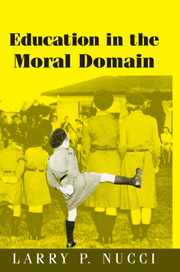Book contents
- Frontmatter
- Contents
- Foreword by Elliot Turiel
- Acknowledgments
- Introduction
- PART ONE THE NATURE OF MORALITY AND THE DEVELOPMENT OF SOCIAL VALUES
- 1 Morality and Domains of Social Knowledge
- 2 Morality and Religious Rules
- 3 Morality and the Personal Domain
- 4 Morality in Context: Issues of Development
- 5 Morality in Context: Issues of Culture
- 6 Morality and Emotion
- 7 Reconceptualizing Moral Character
- PART TWO CLASSROOM APPLICATIONS
- Conclusion: Keeping Things in Perspective
- Additional Resources
- References
- Index of Names
- Index of Subjects
3 - Morality and the Personal Domain
Published online by Cambridge University Press: 12 November 2009
- Frontmatter
- Contents
- Foreword by Elliot Turiel
- Acknowledgments
- Introduction
- PART ONE THE NATURE OF MORALITY AND THE DEVELOPMENT OF SOCIAL VALUES
- 1 Morality and Domains of Social Knowledge
- 2 Morality and Religious Rules
- 3 Morality and the Personal Domain
- 4 Morality in Context: Issues of Development
- 5 Morality in Context: Issues of Culture
- 6 Morality and Emotion
- 7 Reconceptualizing Moral Character
- PART TWO CLASSROOM APPLICATIONS
- Conclusion: Keeping Things in Perspective
- Additional Resources
- References
- Index of Names
- Index of Subjects
Summary
I do not like broccoli. And I haven't liked it since I was a little kid and my mother made me eat it. I'm President of the United States, and I am not going to eat any more broccoli.
(George Bush, April, 1990)Autonomy … appears only with reciprocity, when mutual respect is strong enough to make the individual feel from within the desire to treat others as he himself would wish to be treated
(Jean Piaget, The Moral Judgment of the Child).Up to this point we have been focusing on the ways in which people conceptualize morality and nonmoral (conventional and religious) norms. In order to have a complete picture of the nature of morality and moral development, we also need to consider whether and in what ways people bracket off some areas of their behavior as matters of privacy and personal choice. The relationship between morality and personal freedom is a complex one that has been the subject of sometimes heated debate within philosophy and the social sciences, as well as at the level of public policy.
Morality and personal freedom are often thought of as being in opposition. Some philosophers (e.g., Augustine 401/1963; Kant 1785/1959) and psychologists (e.g., Freud 1923/1960, 1930/1961) have viewed morality as the struggle between the egoistic and selfish desires of the self and the rational and legitimate concerns for the treatment of others. From these views, morality is the achievement of the suppression of the passions and destructive impulses of the self-interested individual.
- Type
- Chapter
- Information
- Education in the Moral Domain , pp. 52 - 75Publisher: Cambridge University PressPrint publication year: 2001



